Toshiba's $7000+ 400 GB SSD: SAS 6Gb/s, SLC Flash, And Big Endurance
Power Consumption
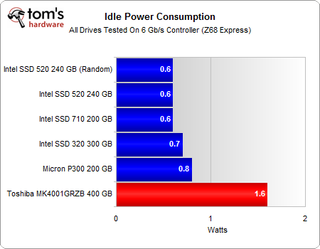
Because SSDs in an enterprise environment are assumed to be active 24x7, idle power consumption doesn't receive the emphasis that it might in a desktop or notebook. Even so, it's interesting that Toshiba's enterprise SSD is the only drive that draws more than 1 W without doing anything at all.
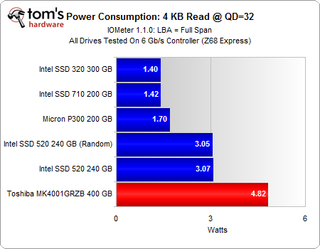
When it's busy crunching 4 KB random access, Toshiba's MK4001GRZB uses more than two times the power of Micron's P300. Both drives employ SLC NAND, so the difference isn't necessarily attributable to Toshiba's choice in memory technology.
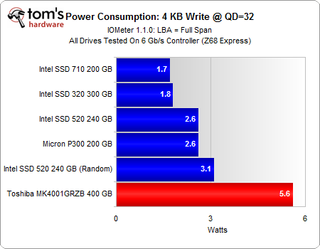
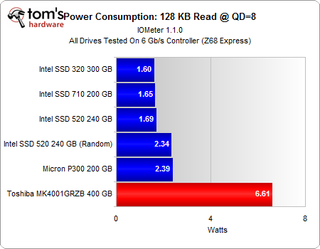
Switching to sequential accesses, the MK4001GRZB consumes substantially more power than all of the other tested SSDs.
If you flip back through the performance analysis, you find that, at a queue depth of eight, Intel's SSD 520 is roughly as fast as the Toshiba drive in this very same workload. Compare that to our power numbers and you find that the SandForce-based desktop drive uses a lot less power to achieve similar performance, making it a more efficient solution in read-heavy workloads.
We see a similar situation evolve in sequential write testing. The P300 outperforms the MK4001GRZB by roughly 19%, yet Toshiba's drive consumes almost 42% more power.
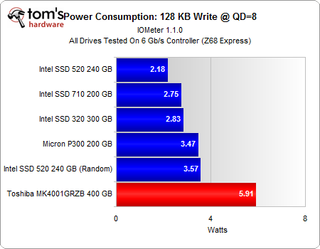
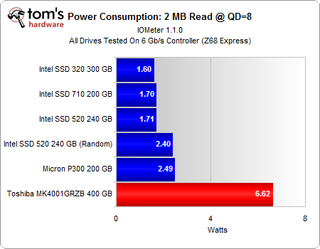
Larger block sizes don’t affect power consumption by much. At a queue depth of eight, 128 KB and 2 MB performance is roughly the same, which means efficiency is, too.
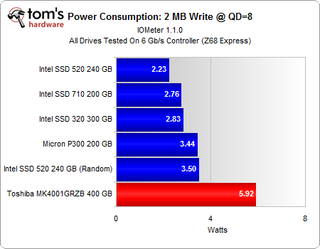
Stay On the Cutting Edge: Get the Tom's Hardware Newsletter
Get Tom's Hardware's best news and in-depth reviews, straight to your inbox.
Current page: Power Consumption
Prev Page 128 KB And 2 MB Sequential Performance Next Page Enterprise Workload Performance-
compton Good job, Mr. Ku.Reply
Perhaps the Enterprise SSD Fairy will bring you a Hitatchi UltraStar with Intel's 6gbps controller. I'd be eager to see how it compares.
There is no substitute for SLC though. -
bennaye nebun$7000 any company willing to pay this much for an SSD is fullishReply
...fullish of cash? Definitely. Foolish? Probably not.
-
nebun bennaye...fullish of cash? Definitely. Foolish? Probably not.damn the english language.....there are way to many words that sound alikeReply -
nitrium Why is the 4KB Random read/write performance shown as IOPS, but 128KB and 2MB performance is in MB/sec? What speed (in MB/sec) does this drive achieve in 4KB? I guess I could calculate it from (IOPS * 4KB) / 1024 (I think that's right), but why should I have to?Reply -
spazoid amdfreakIt is too expensive for the performance it offers. You can get a RAID array of many Intel SSDs beating Toshiba in every segment.Reply
You've clearly not understood the purpose of this article. Stick to commenting the desktop drive reviews in the future, please.
Thank you for this review, and especially your estimations on the endurance of the drive. It's something that's damn near impossible for us IT professionals to get accurate estimations of in the real world. For some reason, bosses tend to want the expensive hardware to be put to use instead of being thoroughly tested.
More of these types of articles please! :] -
@spazoid, so you are telling me that you are willing to pay 10x for an endurance of 3x over the INTEL 520 SSD?Reply
Even when the INTEL SSD already has an endurance longer than your refresh cycle for your tech stack?
-
EJ257 frozonicLOL, i can just imagine myself in ten years telling my kids that we had to pay 7000$ for a 400gb ssd...by that time we are gonna have 400+ TB ssdsReply
"Back in my days storage drives used to have moving parts. Now its all solid state." -
jaquith I own a small data center and thankfully have access to a 'major' financial institutions test data, and I agree with your conclusions especially regarding deployment into production. $7K SSD is a tough call with a 5-year, but if it were 7~10-year then probably an easy call.Reply
Unlike super-sized enterprise which I am not, the cost/benefit calculations would be difficult for myself. I know firsthand the money that i.e. financial institutions push into their data centers, and for those folks $7K isn't out of the question.
Interesting SSD and if the prices come down and warranty extended then IMO it would be something to consider and compare against Intel's products.
Most Popular

